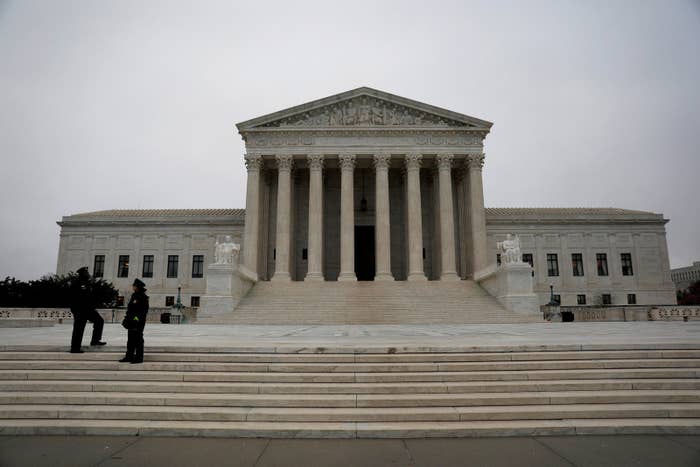
Five people who disrupted proceedings at the US Supreme Court to protest the Citizens United decision pleaded guilty on Thursday to two misdemeanor charges, one month after losing a constitutional challenge to part of the case.
The defendants face up to a year in prison. There was no plea deal, and the lawyers did not offer any hints about what they would seek at sentencing. A sentencing hearing is scheduled for July 24.
Shortly before arguments began at the Supreme Court on April 1, 2015, but after the justices entered the courtroom, the defendants one-by-one stood up and made statements or sang in protest of the Citizens United decision and the influence of money in politics. The protest was tied to the first anniversary of another high court decision on campaign finance laws.
Matthew Kresling, 43, of Los Angeles, told reporters after Thursday’s hearing that the purpose of the demonstration was to give a nonviolent warning to the government that it wasn’t listening to the public about issues such as money in politics. He said he feared there would be violence “if they continue not to hear us.”
Kresling later clarified that he was not threatening violence, and that they were protesting “out of a love for the system” and how they thought it should work.
Prosecutors charged Kresling and the other protesters with violating laws against demonstrations and disruptions in and around the Supreme Court. The defendants challenged the constitutionality of one of the charges, which criminalized a “harangue,” “oration,” or loud language at the high court. A federal district judge agreed that “harangue” and “oration” were vague terms and struck that part of the charge.
The US attorney’s office in Washington, DC, appealed, and in March the US Court of Appeals for the DC Circuit sided with prosecutors, finding that the language was not unconstitutionally vague and that the government could proceed with the case in its entirety.
Federal prosecutors in Washington have taken a tough stance on prosecuting Supreme Court protesters in recent years, bringing charges with stiffer penalties than they did in previous cases that involved similar conduct.
The US attorney’s office came under scrutiny this week for its decision to prosecute a woman who was removed from Attorney General Jeff Sessions’ confirmation hearing after she laughed during remarks from one of the senators. A jury on Wednesday found her guilty of two charges, for violating laws against demonstrations and disruptive conduct at the US Capitol. Each count carries a maximum sentence of six months in prison.
The defendants in the Supreme Court protest case and their lawyers declined to comment on why they decided to plead guilty now, but several defendants expressed frustration with the DC Circuit’s decision. Richard Saffle, 35, of Bridgeport, West Virginia, told reporters after the hearing that the DC Circuit ruling “really hindered our ability to argue what we wanted to argue.”
Yasmina Mrabet, 30, of Washington, DC, said she thought it was “ridiculous” that the US attorney’s office spent resources to appeal the district judge’s opinion striking the “harangue” and “oration” section of one of the charges.
Assistant US Attorney Lisa Walters declined to comment, as did Supreme Court legal counsel Ethan Torrey, who has attended hearings in the past related to protests at the high court.
